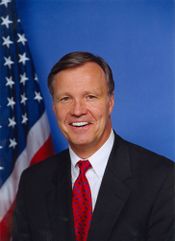الفريق الأزرق (السياسة الأمريكية)
الفريق الأزرق Blue Team، هي مجموعة غير رسمية من سياسيين وصحفيين أمريكيين تتفق آراؤهم على أن الصين تشكل خطرا أمنيا على الولايات المتحدة. Though allied on some issues with Democratic advocates of labor, فإن معظمهم يمكن أن ينطبق عليه مصطلح المحافظون أو المحافظون الجدد. However, بعضا منهم كان يشغل مناصب سياسية هامة في عهد الرئيس جورج دبليو بوش, instead tending to work for the Pentagon, US intelligence services, and private think tanks and journals.
. . . . . . . . . . . . . . . . . . . . . . . . . . . . . . . . . . . . . . . . . . . . . . . . . . . . . . . . . . . . . . . . . . . . . . . . . . . . . . . . . . . . . . . . . . . . . . . . . . . . . . . . . . . . . . . . . . . . . . . . . . . . . . . . . . . . . . . . . . . . . . . . . . . . . . . . . . . . . . . . . . . . . . . .
نشأة وتأصيل المصطلح
يأتي الاسم من اللون الممثل للقوات الأمريكية في ألعاب الحرب، والمناقض للون الأحمر الذي يمثل خصم أمريكا. وقد صاغ التعبير "وليام تريپلت"، المستشار السابق لـلجنة العلاقات الخارجية في مجلس الشيوخ الأمريكي.[1] He meant to describe a divergence arising originally from changing Sino-American relations, particularly as regards the political status of Taiwan. After the Tiananmen Square protests of 1989,[2] and in the context of China's economic expansion, "blue" concerns widened in scope.[3] They worried about China's military and diplomatic ambitions not only in Asia but around the world; they worried about China's protectionist economic policies; most immediately, they worried about the tendency toward accommodation of China by many people in the US government.
Though now applied primarily to الجمهوريs, the terms refers to concerns not tied to a single party or perspective. Bill Clinton campaigned in 1992 against George H. W. Bush's supposed laxness toward China.[4] Though the Republican platform in 2000 criticized Clinton's treatment of China, George W. Bush did not fully embrace the "blue" interpretation of China's aims, nor did he reverse Clinton's policy of constructive engagement.
أفراد مرتبطون
The original core of the "blue team" was a group of Congressional aides who met in an informal study group during the 1990s.[5] Working largely behind the scenes, these aides influenced legislation in subtle and incremental ways. They were involved in attaching to bills riders that forced the State Department to report on حقوق الإنسان abuses and the Defense Department to reveal information it had collected about the Chinese military.[5] Perhaps their largest accomplishment was the passage of the Taiwan Security Enhancement Act in 2000.
By and large, most high-profile American politicians have not spoken out stridently enough against China to be called members of the Blue Team.[6] Some minor politicians have been closely associated with the group or its ideas. Among them are كريستوفر كوكس, chairman of the commission that produced the تقرير كوكس on Chinese espionage;[5] and Gary Bauer, who attacked China virulently during his abortive 2000 campaign for president.
The Bush Administration has for the most part followed the pragmatic approach that has been dominant in US foreign relations since the Shanghai Communiqué. More than the Clinton Administration, it has been willing to see China as a strategic competitor,[7] and it has been "far more eager...to treat China with suspicion and adopt more hard-nosed policies."[8]
Still, the dominant voices of the "team" since 2001 have come not from government but from private conservative think tanks and journals. William Kristol, whose Weekly Standard once described the PRC as "a regime of hair-curling, systematic barbarity,"[9] has called repeatedly for a harsher stance against China. So too روبرت كيگان, co-founder of PNAC. The Washington Times columnist Bill Gertz, روس منرو and David Blumenthal, and Peter Navarro have all written extensively about the supposed threat posed by China.
اعتقادات
The beliefs associated with "Blue Team" opinions arise largely from dissatisfaction with the general drift of American foreign policy toward accommodation with the PRC. The massacre in Tiananmen Square and China's later use of a missile test in an attempt to influence Taiwanese voters sharpened fears about China's intentions;[10] The more virulent critics of China accused Clinton of appeasement.[11]
For some of this orientation, China's military is the focal point of concern, as it was for the original Congressional study group. They point out that China is not only modernizing its army and navy, but is also hiding its actual military expenditures. They claim that China aspires to dominate the region through, for example, the creation of a blue water navy, and that such dominance would inevitably endanger US interests and threaten long-time allies Japan, South Korea, and Taiwan.[12] Blue Team members thus harshly criticized the Commerce department's decision to allow the sale of supercomputers to China because these computers could have military applications.
التأثير
Despite concern for maintaining the status quo, the Cold War security strategy emphasized the ideological difference between China and the US. As the Soviet Union collapsed and Russia's economy and military were still in turmoil, it seemed to some observers logical that China would seek to replace Russia as the main counterbalance to the United States.[13]
Still, the "blue" perspective views with alarm China's increased military spending and the passing of the Taiwan anti-secession law in 2005.[14] This was of major concern to US Defense Secretary Donald Rumsfeld since the Pentagon had frequently complained about the lack of transparency in China's military capabilities and intentions. A recent threat report from the Pentagon supported the Blue Team's fears, with China attempting a military build up aimed at capturing Taiwan and deterring outside help from the US and Japan. Finally, though US policy towards North Korea has depended partly on China's cooperation, some "hawks" in the US suspect China's motives as regards that country as well.[15]
انظر أيضا
هوامش
- ^ Gertz 46.
- ^ Kaiser and Mufson A1.
- ^ Friedman 72.
- ^ Friedman 66.
- ^ أ ب ت Kaiser and Mufson 11.
- ^ "Bush Policy" 11.
- ^ Rice.
- ^ Ikenberry 433.
- ^ Quoted in Gries, 5.
- ^ Buszynski 128.
- ^ Timperlake passim.
- ^ http://www.washingtontimes.com/news/2005/jun/09/20050609-120336-4092r/
- ^ Feffer 123.
- ^ Drell 243.
- ^ Scobell 344-5.
المراجع
- (2003). "A Bush Policy Worth Waiting For?" South China Daily Post. May 29.
- Buszynski, Leszek (2004). Asia Pacific Security: Values and Identity. London: Routledge.
- Feffer, John (2003). North Korea, South Korea: U.S. Policy at a Time of Crisis. Toronto: Hushion House.
- Friedman, Edward (2002). "Reflecting Mirrors across the Taiwan Straits: American Perspectives on a China Threat." The China Threat: Perceptions, Myths and Reality. Herbert Yee and Ian Storey, eds. London: Routledge.
- Gertz, Bill (2002). The China Threat. Washington, DC: Regnery Publishing.
- Gries, Peter Hays (2004). China's New Nationalism: Pride, Politics, and Diplomacy. Berkeley: University of California Press.
- Gurtov, Mel and Peter Van Ness (2004). Confronting the Bush Doctrine: Critical Views from the Asia-Pacific. London: Routledge.
- Ikenberry, G. J. and Michael Mastanduno (2003). International Relations Theory and the Asia-Pacific. New York: Columbia University Press.
- Jensen, Lionel and Timothy Weston (2007). China's Transformations: The Stories Beyond the Headlines. Lanham, MD: Rowman and Littlefield.
- Kaiser, Robert and Steven Mufson (2000). The Washington Post. February 22.
- Rice, Condoleezza (2000). "Campaign 2000: Promoting the National Interest." Foreign Affairs. Jan/Feb 2000. Retrieved September 14.
- Scobell, Andrew (2002). "Crouching Korea, Hidden China: Bush Administration Policy toward Pyongyang and Beijing." Asia Survey 42 (2002).
- Timperlake, Edward (1998). Year of the Rat. Washington: Regnery Press.

